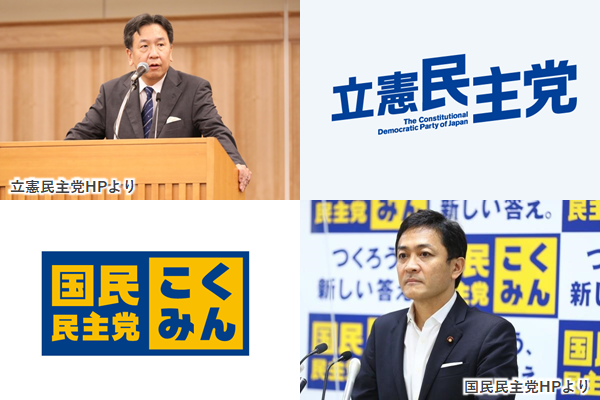In a major realignment of Japan’s opposition camp, the Constitutional Democratic Party of Japan (CDPJ) has joined with most of National Democratic Party (NDP) members and independent lawmakers into a large opposition party that retains the name of CDPJ. The new party is nothing more than a rehash of the defunct Democratic Party of Japan (DPJ) and lacks freshness. In an open debate, candidates for the new party’s leader focused on domestic issues without mentioning the difficult international situation. The debate, as well as a recent one between candidates for the president of the ruling Liberal Democratic Party (LDP), indicated that most of Japanese politicians have failed to be aware of seriousness of big changes emerging in the world postwar order.
Unprecedented realignment led by trade union
The latest political realignment came as relevant opposition parties ran around in a panic amid a sense of crisis that they would lose the next general election of the House of Representatives, or the lower house, without the amalgamation of opposition parties. The problem was that the Japanese Trade Union Confederation, or Rengo, took initiative in putting together the CDPJ and NDP, into which the former DPJ was divided three years ago. This is the first time that a trade union has led the creation of a political party. The defunct Japan Socialist Party (JSP) had been branded as a political division of the General Council of Trade Unions of Japan, or Sohyo, which joined other major trade union groups into Rengo, but JSP was not as subordinate to Sohyo as the CDPJ and NDP are to Rengo. In this sense, Rengo crossed a red line with regard to relations with political parties.
Rengo has prioritized its own convenience to avoid split over the party that Rengo members should support. Political parties should consider the interests of general public, while trade unions consider the interests of their member workers. In the past, when leftist and rightist socialists merged into a unified JSP, they repeated discussions to formulate a single party platform. The merger process this time was quite different.
The new party can be characterized as anti-nuclear power plant and pro-communist.
Coming after the merger will be cooperation with other opposition parties including the Japanese Communist Party (JCP) in national elections. Rather, the election cooperation has been the primary objective of the latest merger. However, we cannot see a vision how the opposition parties intend to build Japan through the election cooperation. In the 1955 regime of the confrontation between the ruling LDP and the opposition JSP, the Democratic Socialist Party and the JSP sought to cooperate with the Komeito party in the elections. Back in those days, the parties hammered out visions to form a government such as a middle-of-the-road coalition government scheme and a JSP-Komeito coalition government agreement. They took much time to work out the visions. At present, however, opposition parties lack any attempt to develop their government visions towards the next general election. Coming out could be an unholy alliance of anti-LDP forces.
Opposition parties could be caught in a united front trap
Behind the opposition camp realignment might have been the JCP and Ichiro Ozawa, who is eager to reestablish an anti-LDP government. At the JCP’s congress in January 2020, its leaders boasted that the anti-JCP wall within the opposition camp had collapsed. In a run-up to last year’s House of Councillors, or the upper house, election, the JCP used a trick of forming an alliance with a civic group to lead other opposition parties to accept 13 policy proposals including the abolition of the national security legislation, the reduction of defense spending, the cancellation of U.S. military base construction in Okinawa, the blockade against constitutional amendments, the elimination of nuclear power plants, the cancellation of a planned consumption tax hike and others that could bring Japan to ruin. The JCP could use the same tactic in the next election.
Due to the woeful state in the opposition camp and the ruling LDP’s stall on Prime Minister Shinzo Abe’s resignation, we see no sign of constitutional amendments coming in the foreseeable future. To break through the political impasse, NDP members who refused to join the CDPJ should cooperate with the Japan Innovation Party and private-sector trade unions under Rengo to form a new force for amending the constitution and discuss specific amendments with the ruling LDP. If the latest opposition camp realignment leads to the development of a new political framework, the current pinch may turn into a chance.
Shohei Umezawa is Chairman of the Council of the Japan Institute for National Fundamentals and Professor Emeritus at Shobigakuen University.


